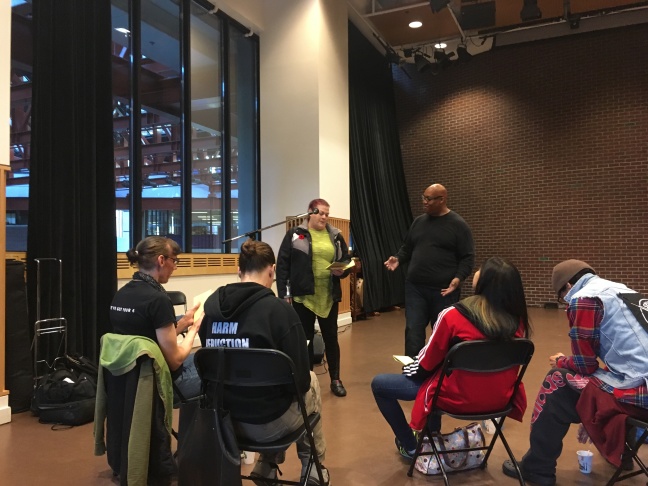Posted on behalf of Jim McLeod (italics added)
***
“Come on, just one more – I swear this will be the last time.”
“Yeah, that’s what you said last time – fuck, you say that every time, but tomorrow it’ll be another day, another needle.”
“No, no, I don’t claim it’s the last time every time, YOU keep trying to tell yourself that. And tomorrow will be another day another dozen hits – I just meant this’ll be the last one of the night.”
“Yeah, of course, I shoulda known – I can’t even try to just, like, take one day off or go on a vacation. Hell, you want to go even harder tomorrow.”
“Hey, hey, relax – come on, where would you be without me?”
“Without you? I dunno, probably at work, or at home, since without you I’d probably still have a real job and a home.”
“You’ve got a home again…”
“Yeah, and what a home. Don’t have my own kitchen or bathroom, but I do have to put up with more rules than when I lived with my parents.”
***
Drug abuse is not a disease, it’s a symptom.
If people still insist on calling it a disease, it would be like the chest cold that’s getting worse and it’s becoming pneumonia because you are HIV+. No matter how bad the cold or pneumonia gets, the cold isn’t really your problem, it is merely a manifestation of your real problem – the HIV. In the same way, no matter how bad your addiction becomes, how many different things you become addicted to, or to what depths your addictions drive you, they will never be anything more than indicators of your real problems and the severity of those problems. Symptoms. This is why there are countless people who use chemicals problematically but, comparatively, there are very few addicts with truly problematic use. These are the people with real problems who truly need help. Unfortunately, most people [who try to help] just end up making addicts’ lives that much worse and wasting their time because they try to “cure” the addiction. All the time ignoring the people’s real problems and trying to deny them their coping mechanisms. All this – shaming and belittling them, invalidating their true profound fears and pains, marginalizing them and the countless other things inflicted upon them (often with the best intentions) – usually serve to make the addictions worse and to drive the addicts further away from the people and services claiming to want to help.
I have more than enough problems, I don’t need your guilt, shame, anger, and disappointment too while you second guess and judge me. This is just fuel to a fire causing endless, horrific cycles. People trying to “cure” addictions are often just as bad as greedy quack doctors, there’s little money in cures, so you don’t treat the disease, you treat the symptom. As long as you only treat their symptoms, the poor bastards will constantly be forced to come back over and over again because the temporary appearance of health is a façade, since you haven’t treated the disease. It’s still there – growing and festering, waiting to resurface.
For years when I went to WAHRS or various user support groups, I would say what pretty much every one said: “I’m Jim, and I struggle with addiction.” But eventually I realized that wasn’t quite accurate. The truth is, I rarely struggle with addiction. For the most part, I’ve come to accept my addictions and the needs for them – in reality, what I struggle with is life as an addict. In a society that refuses to accept the truth about addiction and the reasons behind it, what I really struggle with is stigma, marginalization, lacks of real, effective supports, and things which only serve to exaggerate the problems.
Also, there’s the failure to realize that getting me to quit drinking and using drugs might actually be a bad idea. Like down in the States they had this shot that basically “inoculates” you to heroin so you can’t get high anymore (I guess it was a long-lasting uptake agonist). The problem is that doesn’t really ‘cure’ anything, it just takes away one of the person’s coping mechanisms. If you do that to someone without actually dealing with the issues that led to the addiction in the first place, who knows what they’ll turn to next. Their next coping mechanism could be far more dangerous or harmful to themselves or others. They might become addicted to sex, petty theft, gambling, violence – it could be anything, but you can be pretty sure it will be something. If the full extent of the treatment was to take away their ability to get high from heroin without healing the trauma that led to it, they’ll just need to find something else – hell, some people are addicted to cutting themselves.
It’s like I said earlier – drug abuse is not a disease, it’s a symptom. Until we as a society and the policy makers realize this, we aren’t going to get very far.






